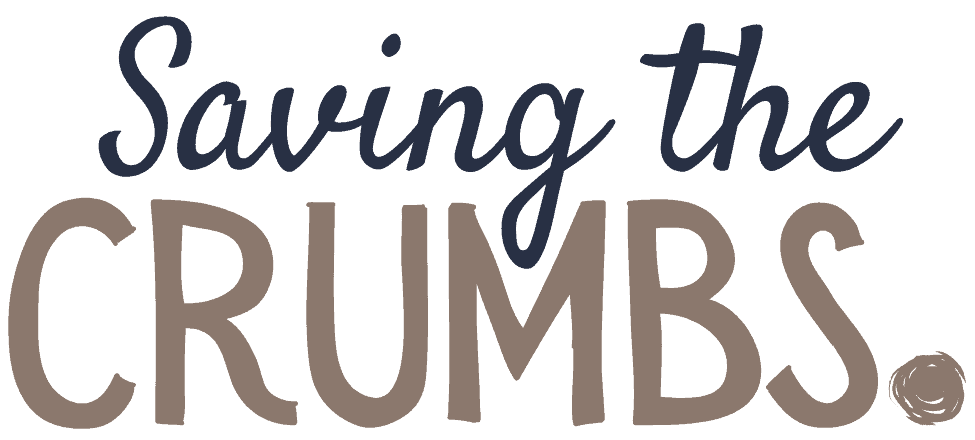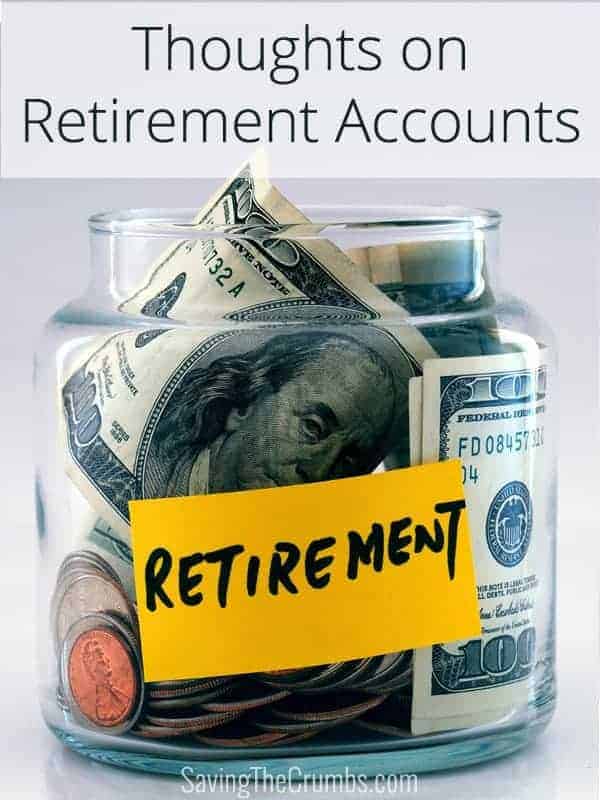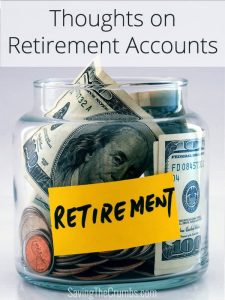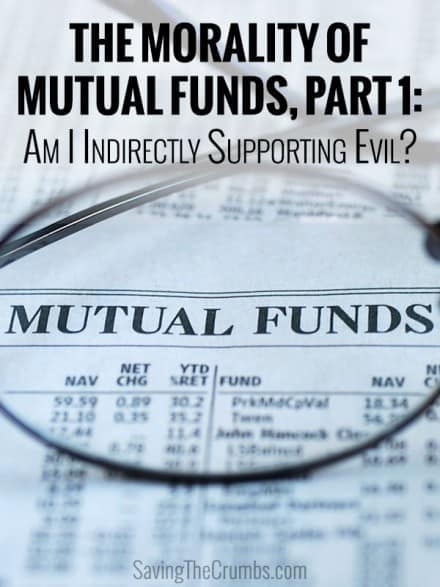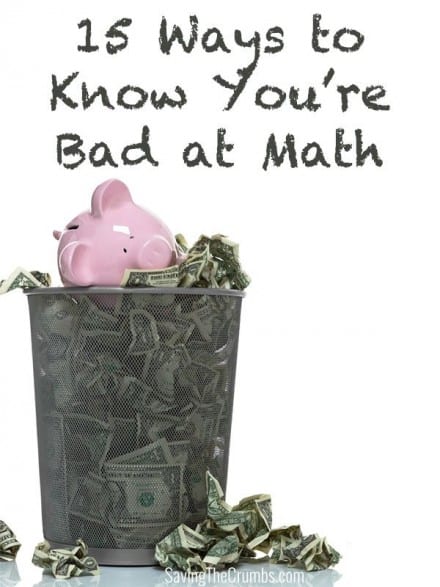Have you heard of the IRA? Or the 401(k)? Or what about the 403(b)? How about the Roth IRA? SEP-IRA? It sounds like alphabet soup! I’m no expert in retirement accounts much less a tax expert, but since I’ve been asked a few times about them, today I’d like to share a few thoughts on the subject. I know I felt my eyes glaze over the first time I heard about these things too, so hopefully some of what I’ve learned along the way can help demystify the issue a little bit. The information here will be US-specific, so my apologies to our international readers!
Retirement Accounts Simplified
The two main features of retirement accounts that helps categorize them are:
- Pre-Tax vs. Post-Tax: All retirement accounts are tax-advantaged. A big differentiating question is whether the money going into the account comes from our pre-tax income or from our post-tax income. We’ll discuss this more below.
- Individual vs. Employer: Is the account one I open up individually, or is it an employer-spnsored account from work? A critical benefit with the employer-based accounts is that frequently there are employer-matched incentives for putting money into those accounts.
Here’s a breakdown of some of the most common account types*:
| Individual | Employer | |
| Pre-Tax | Traditional IRA | 401(k), 403(b) |
| Post-Tax | Roth IRA | Roth 401(k)/403(b) |
*There are also variations like the SEP-IRA for the self-employed, and the SIMPLE IRA that’s actually employer sponsored. Actually, according to this article, there are 11 (no joke!) different types of IRAs! There are also many other types of employer-sponsored plans.
I don’t want to bore you (and I simply don’t have the interest) to detail out the fine nuances distinguishing each of these types of accounts (or the scores of other variations that I didn’t mention), but you can talk with your HR department, accountant, or do more research online. But today I want to address primarily how the two main characteristics of these accounts benefit us, and subsequently how we ought to think about them.
Accounts Not Investments
I’ve been asked more than once, “Should I invest in an IRA? What kinds of returns do IRAs make?” Sometimes I’ve been tempted to respond by asking, “How many miles does your frequent flyer account earn you?” You see, IRA stands for “Individual Retirement Account” (or “Individual Retirement Arrangements”) meaning it is simply an account or a CONTAINER; it is not an investment in and of itself. This is the same for 401(k), 403(b), Roth IRAs, and others. They are simply accounts designed to segregate your money for tax-advantage purposes, and within those accounts you may purchase assets or investment instruments. So you can have investments inside of your IRA/401(k), but your IRA/401(k) itself is not the investment.
So one person’s retirement account may consist of all mutual funds while another’s is all in CDs while yet another holds gold and real estate in their’s. The key is recognizing the benefits and pitfalls of each account type and utilizing them wisely for our financial planning.
All of this begs an important question. Why even bother with these newfangled things when we can invest in other much less confusing ways? Certainly, no one is obligated to have them but the reason many do is because they can help us save and make more money!
Taxes: Pick Your Poison
In non-tax-advantaged investment accounts, we are dealt a double-whammy in the form of double-taxation. The money that we invest today has been taxed already in the form of our income tax. As that money works for us in investments and we realize the gains that it generates, we get taxed again on the amount that is earned. Bummer!
This is where retirement accounts come in to allow us to pick just one of the two taxes to pay. If we pick a Traditional IRA or a 401(k), the money we deposit into the account is spared our current income tax, but all of the earnings down the road will be taxed at our income tax level at the time of withdrawal. With a Roth IRA or Roth 401(k), we pay our income taxes on that money now, but the money with all its earnings will be tax-free when we withdraw in the future. So instead of getting socked twice, retirement accounts allows us to just pick one poison.
So which is better? Depositing pre-tax or post-tax money? The answer will vary depending on your exact situation, so you will need to consult a financial advisor or accountant for the best answer. But in short, you will need to figure whether you will save more by paying that tax today or someday in the future.
Want Free Money?
As mentioned earlier, most employer-sponsored retirement programs like 401(k) or 403(b) include an employer match for contributions. In a personal finance presentation I heard recently, the presenter flat out said, “If you are offered an employer-match on your 401(k) or 403(b) and you don’t take it, you are stupid.” It might sound harsh, but in most cases, he’s right. You are turning down FREE MONEY. But the most common objection is, “To get the match, I need to contribute a certain percentage of my earnings. What if I need that money?” This leads to our next point.
There is One Catch
So with all these benefits of retirement accounts, what’s the catch? The biggest one is simply the fact that the money put into these accounts are restricted from withdrawal until sometime after we’re 59.5 years old. (Well, technically it can be withdrawn with hefty fees and taxes, but with so many penalties, let’s assume those aren’t real options for now.) So why should I lock up my money for so many years (decades!) when I can use it now? What if something happens and I NEED that money?
There may indeed be legitimate reasons for not locking up that money in these retirement accounts for so many years, and that’s a question that only you’ll be able to answer for yourself. But please don’t let the present desire to consume be the excuse that prevents us from saving for the future!
What We Do
Neither Deb nor I have employer-sponsored retirement accounts, so a few years back we each opened a Roth IRA. Back in those days, we earned so little income that we ended up in the 0% tax-bracket (actually we ended up getting money from the IRS because we earned so little), but we took advantage of the situation to stash a couple thousand dollars each into a Roth IRA. Meaning, we paid 0% taxes on the money going in and we will pay 0% on the money coming out. Sometimes it pays to be poor! Of course, this tax situation no longer applies to us, and we’ve hit pause on our Roth IRA contributions as we are funneling all of our efforts toward paying off our house within the next year–the timing of which has a lot to do with our most recent big announcement. We’ll get back to the Roth IRA afterward.
If we did have an employer-matched 401(k) or 403(b), we would deposit as much as needed to get the full match, then we would fund our Roth IRA, and if we still had money left over, we would then consider funding our 401(k)/403(b) up to the max or we might invest in a taxable account, depending on how likely we would need the cash–or how much we need to set aside for Baby Crumb’s college!
Oh yeah and in case you missed it, a few weeks ago I shared a post on the topic of How Christians Should View Retirement. It’ll give some background on how we philosophically approach retirement savings.
Do you have a retirement account? Why or why not? What is your thinking process behind your choice?
